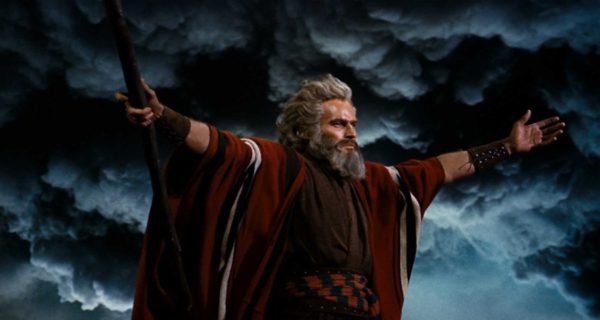Growing up, I remember Palm Sunday being a particularly special event, mainly because the grand epic of The Ten Commandments came on TV. We always crowded around the TV to watch this grand masterpiece, only greater in weight and gravity than the Lord of the Rings because it had been out longer and because it was a story from the Bible, literal history, and the reason behind the celebration of the Passover.
Charlton Heston and Yul Brynner command the screen with their presence as Moses and Ramses II, the two men who seem to have the freedom of the Hebrews in a tug of war. They are joined by a host of colorful characters and phenomenal actors, such as Vincent Price, Anne Baxter, Debra Paget, John Derek, Esther Brown, and many more. But of course the focus is on them as God sends Moses to the Pharaoh to get him to let the Jews go free, and uses Moses to call upon the plagues He sends to Egypt to smote the great country for its misdeeds. To add to the unforgetfulness of the two-part movie are the back-drops of the real Mount Sinai, gorgeous set pieces, lovely costumes, and an epic score. It does help that many of us grew up watching this on or around Palm Sunday. How many of us are continuing the tradition is another question entirely, but one can’t deny how much of an impact seeing that film upon one’s mind, and sometimes, one’s heart.
Many times throughout the film comes the question of whether there is a God and why hasn’t He replied to His people’s cries for deliverance. We are shown that God’s timing is very often not our own and that sometimes He has to wait because someone just isn’t ready to take on the role He knows we are capable of taking on. Moses had to lose everything to see, to understand what his own people were going through to set him against the Pharaoh, someone he grew up with. Though Ramses II was often trying to take everything Moses had rightfully earned, Moses still had other lessons to learn. One of which was a complete faith in the Lord High. Moses had to learn to trust the Lord entirely before leading his people out of bondage. It was a long and painful road, but a necessary one in order for God’s plan to work. Even then, during the trip across the wilderness from Egypt to the new land, Moses doubted God. It’s not shown in the movie, it could only fit so much, and it still ended up being over three hours long.
Another theme the film explores is the issue of slavery. While in the Bible the Hebrews did have slaves after leaving Egypt, the film takes a more firm, perhaps more modern, outlook on slavery, that slavery in general is horrible. Every man should decide for themselves what they should and shouldn’t do, what work they want to do, and that they should be compensated accordingly. A very good premise to touch upon, especially in this story, obviously, as a people are finally freed from their long term of oppression. But as with all people, it seems, how easy it is to forget said oppression at the first sign of discomfort. During the trek across the wilderness, the jubilation of freedom died down and they, like Moses, lost their faith in God’s promises. Even after the miracles God used to free them and get them to safety, they still don’t trust Him enough to get them through the wilderness. One could say that after being in slavery for so long, they had every reason to not trust God sometimes. But one could make the argument that God was using the natural process of biology to harden His people for said trek in the wilderness, as well as an attempt to keep them humble and grateful for all that He’s doing for them. And while Moses is on the mountain conversing with God, getting instructions for the Ark of the Covenant and the priestly robes that Aaron and his sons would wear, as well as the Ten Commandments, the people of Israel began doing the very things God was telling Moses they should not do. This prompted the Lord to punish them by letting them wander the desert for another forty years or so. So while freedom is good, ungratefulness and complaining will sour that jubilation of freedom real quick. Why complain about being a slave if you’re going to complain about being free not three days later?
All in all, this film is a masterpiece, a giant among great films, and for good reason. It stays with you for days after viewing it. The music fills you with a sense of wonder and hint of fright at the mighty power of God. While there are a few faults with it, understandable for its time, it still manages to convey important parts of the story of Moses. One could say its influence can be seen in the Lord of the Rings, particularly the “You shall not pass!” scene (Fellowship of the Ring, 2001). Also understandably so, seeing as how Tolkien stated the Bible was one of his inspirations, it would make sense that Gandalf would copy Moses from time to time, considering he dealt with parlor tricks as well as holding some real power given to him from a Higher Power. But that is a discussion for another time. If you have not seen The Ten Commandments yet, I hope you do, especially during the Passover, the holiday that was created because of the events that occurred in this movie, and I hope you like it! If it isn’t your thing, but still want to see something based on the Exodus, there is also Dreamworks’ The Prince of Egypt, equally as memorable and impressive in its own right.
